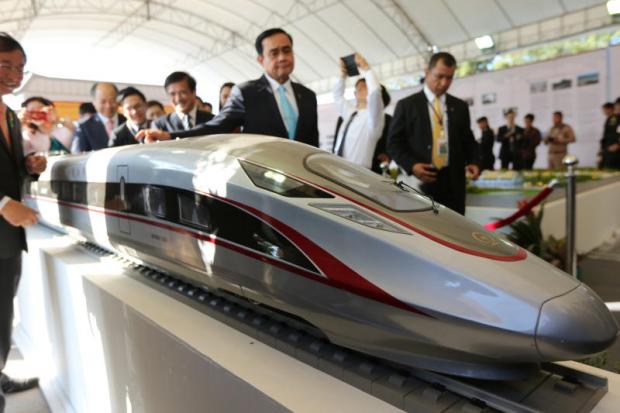
The government has insisted the Thailand-Japan partnership for joint investment in the Shinkansen-like high-speed railway from Bangkok to Chiang Mai remains intact, despite recent reports that Japan was solely interested in offering loans for the project.
It also confirmed the development will be based on the original goal of 300 kilometres per hour to make the high-speed train competitive against low-cost airlines.
Deputy Prime Minister Somkid Jatusripitak said Japan still fully supports the 670km Thai-Japanese high-speed train route, with Transport Minister Arkhom Termpittayapaisith busy negotiating the joint development.
"The project will run at 300kph, as suggested by Japan. The government's study found that any plans to lower the maximum speed to 180-200kph would not be worth the investment cost," he said.
Virasakdi Futrakul, deputy minister of foreign affairs, said a reduction of the speed will make the project less competitive, as potential commuters will opt to use low-cost airlines instead.
"Thailand and Japan have engaged in talks for long in the Bangkok-Chiang Mai high-speed rail project under government-to-government cooperation, while Japan itself has already offered to conduct a feasibility study," he said.
Mr Arkhom said the project requires advanced technology and high investment costs, for which the Thailand and Japan governments need to take time to decide upon an appropriate investment type.
"Normally, for investments in megaprojects, the Thai government needs to rely on loans," said Mr Arkhom.
"However, to construct a high-technology project such as the high-speed train, the Thai government is desperate for Japan's participation."
Thailand signed a memorandum of cooperation for the project with Japan's Ministry of Land, Infrastructure Transport and Tourism in May 2015.
Japan, via the Japan International Cooperation Agency (Jica), began a feasibility study on the first phase of the high-speed train, from Bangkok to Phitsanulok, in December 2015 and completed it in November last year.
The study focused on two issues: the 380-km rail route to link Bang Sue station in Bangkok to Phitsanulok, and the train system's technology, with its top speed of 300kph.
The train track is 1.435 metres in width.
There will be seven stations -- Bang Sue, Don Muang, Ayutthaya, Lop Buri, Nakhon Sawan, Phichit, and Phitsanulok -- along the route.
The whole trip is estimated to take some 3.5 hours.
The fare for travelling from Bangkok to Chiang Mai or vice versa will cost just over 1,000 baht.
According to the Jica study, the construction of the Bangkok-Phitsanulok section will cost 276 billion baht. The service will handle a maximum 29,000 passengers per day after its launch in 2025, with this expected to increase to 50,000 per day by 2055.